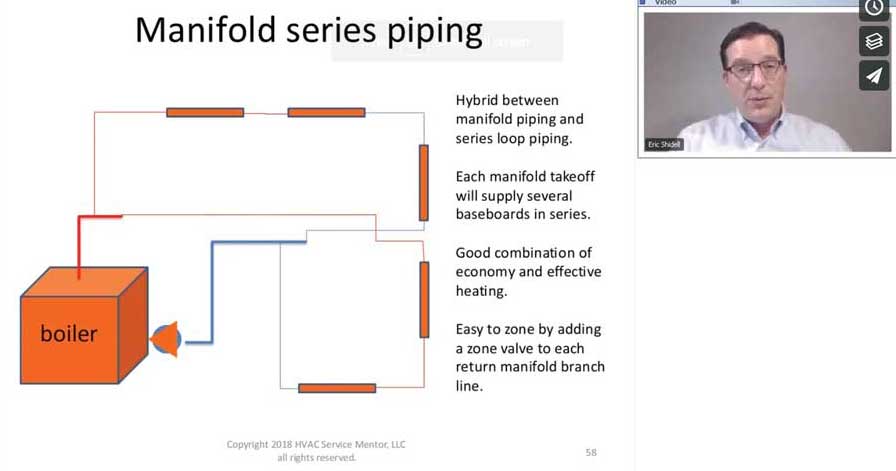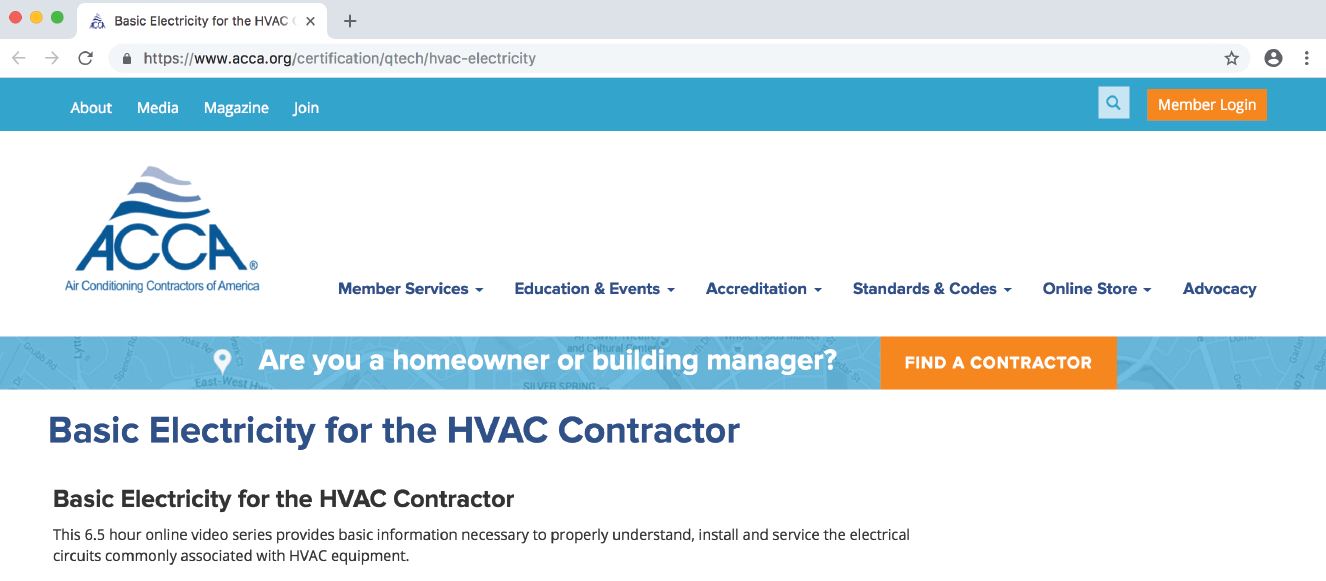Learning is its own reward, as the saying goes. But what’s even more rewarding for HVAC techs and their employers? Learning accompanied by North American Technician Excellence (NATE) credits.
NATE certification means something because it involves a commitment and reflects reliability and proficiency. According to NATE, around 34,000 technicians have reached that status, with over 5,300 contractors getting their own certifications. Then there’s recertification. NATE requires techs to put in 16 training hours every two years to stay in good standing.
So it’s no surprise that the demand for qualified training is strong. In most cases, though, the desire for continuing education outstrips the practicality of taking time off to attend manufacturer-held classes or other out-of-town training. The good news is, classes are coming to field techs more conveniently than ever.
A look at a trio of NATE Recognized Training Providers — two companies and one association — illustrates how today’s technicians are just an internet connection away from furthering their careers.
FROM MYSTERY TO MASTERY
“From 1997 to 2015, I was a top HVAC service technician, running calls and getting things running when no one else could. Not only that, but also mentoring and educating other technicians and molding them into experts in their own right.”
That’s Eric Shidell, founder and lead trainer for HVAC Service Mentor (www.hvacservicementor.com). In 2014, he began his online and in-person training business. The company’s course menu includes options such as AC Boot Camp, AC Masterclass, Boiler Basic Training, and Gas Heating Boot Camp.
Shidell’s experiences over the last few years are reminders that this type of training isn’t just about getting a piece of paper.
“A student in a recent boiler course commented that he was glad to attend because he was scheduled to go on a call that was dealing with the exact subject we were discussing in class the very next morning,” said Shidell. “The fill and purge techniques shared in class may have saved him hours of frustration on that job.”
HVAC Service Mentor can attest that this type of training can also come in handy in ways one might not think of right away. Consider a technician who already has a significant skill set but who moves to an area where different types of systems or technologies are much more popular.

Team trainer: In its own twist, HVAC Service Mentor shows its commitment to working professionals by requiring that all students either be employed by a licensed contractor or be a licensed contractor themselves.
“We recently enrolled a technician who had decades of experience in a heat pump market,” Shidell said. “He had relocated into a gas heating market and was a little lost. Our Gas Heating Boot Camp helped him tremendously.”
They also get a lot of technicians who are transitioning from installation into service.
“I remember one contractor in particular from Nebraska who was a darn good installer and decided to go into business for himself,” recalled Shidell. “He quickly found that diagnostics and troubleshooting were not his strong suit.”
CANADIAN CAN-DO
Meanwhile, in Nova Scotia, Canada, Shawna Henderson is the CEO of Blue House Energy. Blue House has been delivering online training to the home renovation and construction industry (including not just site crew but office staff) since 2013.
Henderson describes Blue House’s online courses as “short, sweet, and to the point.” The courses explain concepts using graphics and animation.
Assorted certifications are available depending on the particular course, so interested professionals should check accordingly. Some of Blue House’s offerings include Building Science Basics, Construction Technology, Healthy Indoor Environment, Understanding HVAC Systems, Envelope Fundamentals, and Construction Math 1 & 2.
HIGHER IQ THROUGH Q-TECH
ACCA rolled out its QTech online learning program just three years ago, but that doesn’t mean the organization is new at this sort of thinking.
“It’s in our DNA,” said Todd Washam, director of industry and external relations, ACCA.
The resources have been in place for a long time, thanks to staff members like Glenn Hourahan, senior vice president for research and technology.
For ACCA, online training is “one of the areas we don’t always turn a profit on, but it’s what we have to do to help the industry,” Washam said. “We’re always highlighting to refrigerant manufacturers that they are investing in these programs to have more technically competent techs with fewer callbacks.”
The QTech catalog recently added 10 courses. They address topics such as zoning and understanding how to put in dampers, what to do with excess airflow, and how to work so you’re not backing up air into the system, according to Washam.

POPULAR PICK: According to Todd Washam, director of industry and external relations, ACCA, the course on electricity basics is one of ACCA’s most popular offerings. Members report techs are entering the business without adequate skills.
One especially relevant decision was the association’s relaunch of an Environmental Protection Agency (EPA) 608 training course. ACCA had been outsourcing this particular class but has brought it back in-house, featuring new test materials and educators for those facing upcoming refrigerant-related requirements.
Washam also took time to highlight the courses focusing on quality installation and related maintenance. Those, he said, are built on ANSI-based standards supported by manufacturers that helped develop those requirements in the first place. The installation course is more of the bare essentials to do it well, Washam explained, while the maintenance course goes over protocols and scope of work for a pro-level maintenance check.
TOP OF THE CHARTS
Ask these training providers about their most popular courses, and the answers demonstrate that each organization develops their own favorites. Each one has successful options that don’t necessarily have much to do with other organizations’ user favorites.
Blue House Energy’s most popular course is either Building Science Basics or Understanding HVAC Systems, reported Henderson. Blue House has divided most content up into 10- to 15-minute chunks.
At ACCA, Basic Electricity holds down the top of the list, along with the HVAC course designed for office and sales staff. Washam said that in a member survey, 95 percent of respondents said that techs were not entering the business with adequate skills regarding electricity fundamentals.
“Really good hot water boiler technicians are hard to come by,” said Shidell as he set up his company’s popularity winner. “Many companies who do take boiler calls may only have one tech who is really good with them, and his schedule is usually pretty full. The Boiler Boot Camp is very popular for that reason, because we help techs who are already well-versed in forced-air systems and teach them the crucial knowledge needed for hydronic work.”
TIME KEEPS SLIPPIN’
While customer favorites may vary from provider to provider, it seems that this training sector is unified on one goal: design courses so that even if they have multiple parts, those parts can be consumed in ever more digestible morsels.
ACCA’s Washam said that while the overall hours vary (the longest is six hours), QTech courses are broken up into very short five- to 15-minute segments so that technicians can make progress and complete courses on their own time.
Blue House Energy sticks exclusively with online learning. Henderson said that courses can take anywhere from three to 28 hours of effort, depending on the course. She said this may also vary depending on the knowledge base that the learner already has.
As for HVAC Service Mentor, its boot camp courses (air conditioning, gas heating, and boilers) comprise 18 total hours spread over six online sessions. The air conditioning master class requires three online sessions of three hours each.
DEEPER PAYOFFS AND MOTIVATIONS
Dig around a little further, and more layers of motivation to encourage additional training come up.
“It is frequently reported that significantly large numbers of ‘bad’ parts returned to manufacturers under warranty are either not defective at all or show evidence of improper service, installation, or application,” said Shidell. “We know that this is true and that it hurts the contractor the most. The time spent doing those unnecessary warranty jobs could have been spent satisfying paying customers and getting new work.”
Like each provider contacted for this article, ACCA sees many contractors who are steering their employees to take the courses.
“We also get a lot who are doing it on their own, maybe to find a different company to work for, make themselves more marketable,” Washam said.
There may be no better time than now for that particular strategy.
A recent survey of salaries in the construction industry noted that HVAC technicians had experienced the largest salary bump of any category (over 20 percent) since the last survey, so the market for talent remains demonstrably hot.
While some techs come to courses looking to boost their versatility and earning potential, Shidell said that others may look for training with a more modest agenda: They’re just trying to keep up.
“We have seen techs come into a program a bit harried and overwhelmed because they were ‘thrown to the wolves’ when they first started,” Shidell said. “They leave more confident and more capable.”
METHOD MATTERS
At this point, it should be clear that training providers — whether NATE-approved manufacturer courses or organizations like these — share some common assets and appeal but also have their particular strong suits and peculiar delivery options.
ACCA points to the ability to buy in bulk, where contractors get a slide deck (without the voiceover). Contractors can then modify it based on their local conditions and code requirements (e.g., perhaps their locality doesn’t require ASHRAE 62.2) if they want, with assistance from the ACCA team to get started.
That sort of customization can extend to tailoring for a tech team that prefers a specific sort of tool.
ACCA has also seen utilities make bulk purchases — as many as 1,000 courses at once. They would then give the courses out to contractors who participate in their rebate programs.
Since the association does teach some in-person courses, it can also cater to those with more of a “let’s just get it over with” mentality. Contractors in the Washington metro area have bought, for example, 10 or 20 courses. They then schedule a big day of staff training, bring everyone in on a Saturday, and boost training hours and expertise across the board.
In its own twist, HVAC Service Mentor shows its commitment to working professionals by requiring that all students either be employed by a licensed contractor or be a licensed contractor themselves. That knocks out any ambitious do-it-yourself homeowners (and any aspiring but still-unemployed HVAC techs) but maintains its mission.
The company holds private live training programs to a few serious HVAC contractors who are willing to commit to a minimum annual program, said Shidell. He also conducts some occasional live training events in Denver and Colorado Springs, Colorado, throughout the year.
So all in all, HVAC Service Mentor offers live streaming online sessions with users in other locations, recorded sessions, and some in-person events. It also sells something called TechFlix, where a user can rent a two-plus hour video on a narrower topic like thermostatic expansion valves (TXVs), computer room units, or electric motors.
COMING ATTRACTIONS
Henderson sees some areas for growth on the horizon at Blue House. In particular, courses may expand to look at ASHRAE 55, ASHRAE 62.5, right-sizing space conditioning equipment (with emphasis on Canadian heat loss/gain calculations under its respective codes), and how to use heat pumps for cold climates.
She also sees Blue House extending more into micro-courses for its next catalog expansion.
HVAC Service Mentor will launch a “virtual service meeting” option, according to Shidell. This entails a series of focused classes designed to replace one of a contractor’s existing weekly meetings. Its goal is to develop a culture of continuing training to help a client stand apart from the competition.
At ACCA, Washam expects a big response to the debut of the association’s online flammable refrigerant training program.
Learning may be its own reward, but doing better work and making a better living are pretty good byproducts, too. With these and many other training opportunities coming online, interested companies and employees can log in and step up.
Publication date: 1/21/2019
Want more HVAC industry news and information? Join The NEWS on Facebook, Twitter, and LinkedIn today!



Report Abusive Comment